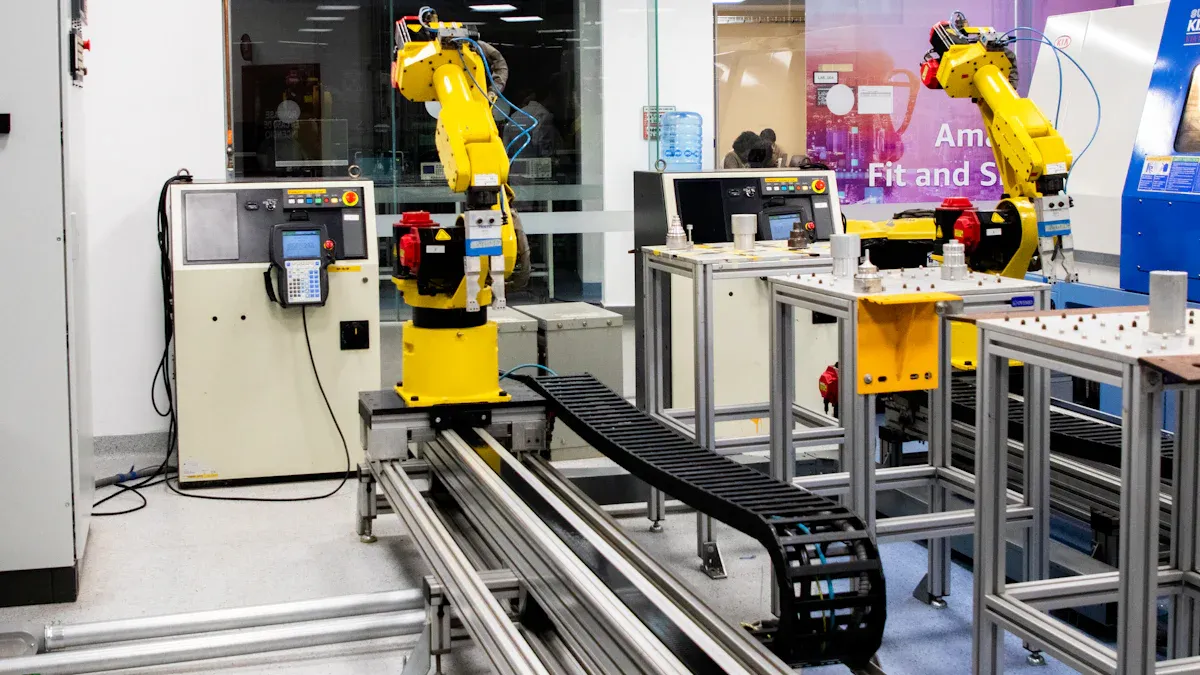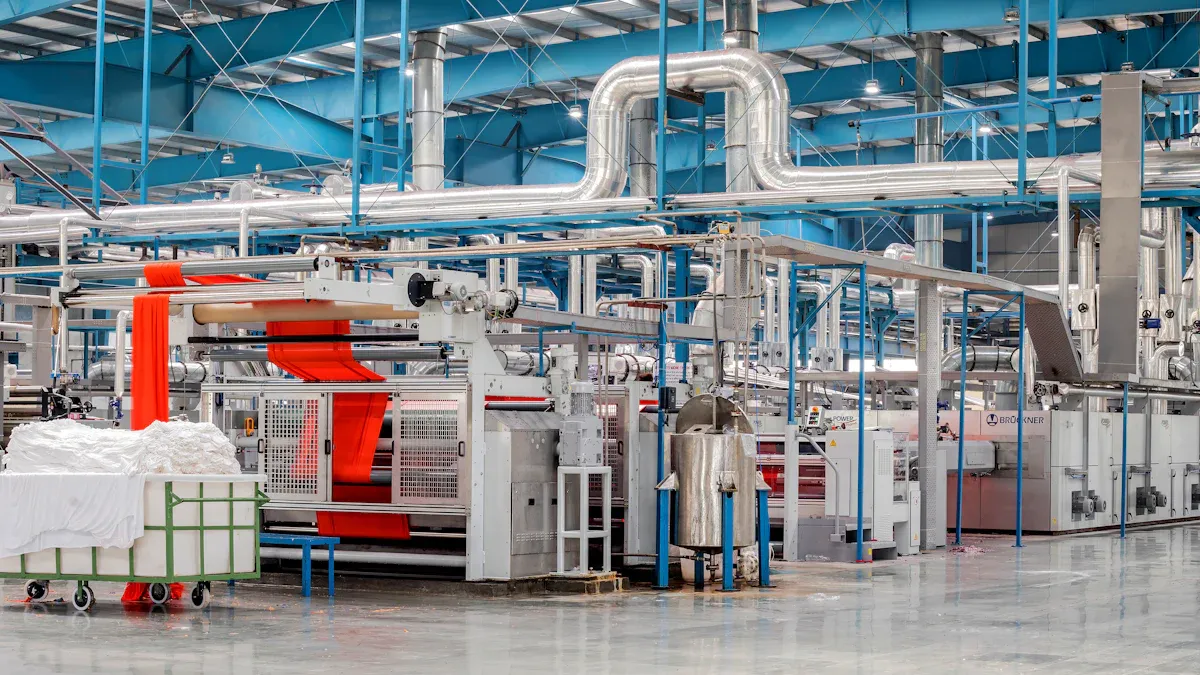
Parallel twin screw barrels revolutionize material processing. These advanced systems provide enhanced mixing, superior temperature control, and improved energy efficiency. As industries adopt these technologies, the twin parallel screw barrel becomes essential for applications like PVC pipe production parallel twin screw. Their innovative design optimizes performance and meets the demands of modern manufacturing.
Enhanced Mixing with Parallel Twin Screw Barrels
Parallel twin screw barrels excel in enhancing mixing capabilities, which is crucial for achieving high-quality material processing. Their design allows for effective interaction between the screws, leading to improved material homogeneity and faster processing times.
Improved Material Homogeneity
Achieving uniformity in material composition is vital for producing high-quality products. Parallel twin screw barrels significantly contribute to this goal. A study by Mendez Torrecillas et al. (2017) demonstrated that various process variables, such as feed rate and liquid-to-solid (L/S) ratio, play a crucial role in the homogeneity of granules produced through continuous twin screw wet granulation. The findings indicated that parallel twin screw barrels effectively manage these variables, resulting in superior material homogeneity compared to alternative technologies.
The benefits of enhanced material homogeneity include:
- Optimized Temperature Control: This ensures uniform polymer melting, which enhances process efficiency.
- Reduced Defects: Minimizing issues like unmelted material, warping, and degradation leads to higher product quality.
- Improved Mixing and Processing: Intermeshing screws enhance shear and mixing, resulting in better homogeneity.
Faster Processing Times
Parallel twin screw barrels not only improve material homogeneity but also accelerate processing times. Their design allows for continuous operation, which reduces downtime and increases throughput. The efficient mixing action of the screws ensures that materials are processed quickly and uniformly. This efficiency translates into shorter production cycles, enabling manufacturers to meet growing market demands without compromising quality.
Superior Temperature Control in Parallel Twin Screw Barrels

Parallel twin screw barrels excel in maintaining superior temperature control, which is essential for high-quality material processing. Their design allows for consistent thermal management, ensuring that materials are processed at optimal temperatures. This capability significantly enhances product quality and minimizes defects.
Consistent Thermal Management
The ability of parallel twin screw barrels to provide consistent thermal management is a key advantage over other extrusion technologies. These barrels offer superior process stability and control, allowing for precise temperature management. This precision is crucial for effective material mixing and ensures that the final product meets quality standards.
Tip: Consistent thermal management helps reduce the risk of defects in extruded materials, leading to higher customer satisfaction.
Reduced Material Degradation
Improved temperature control in parallel twin screw barrels leads to reduced material degradation. The following table summarizes how various factors influence material degradation:
| Factor | Effect on Material Degradation |
|---|---|
| Increased Throughput | Reduces residence time, leading to lower mechanical degradation. |
| Higher Filling Level | Reduces thermal and thermal-oxidative degradation due to less oxygen availability. |
| Higher Barrel Temperature | Increases thermal degradation but lowers viscosity, affecting mechanical degradation. |
| Low Throughput & High Melt Temperature | Increases overall material degradation. |
Maintaining optimal temperatures prevents excessive heat exposure, which can lead to significant degradation. For instance, higher temperatures from aggressive screw designs often result in smoke and discoloration of materials. Conversely, extended melting-zone designs allow for higher throughput rates while maintaining lower melt temperatures, effectively reducing degradation.
Energy Efficiency of Parallel Twin Screw Barrels
Parallel twin screw barrels demonstrate remarkable energy efficiency, making them a preferred choice in modern manufacturing. Their design leads to lower power consumption, which significantly impacts operational costs.
Lower Power Consumption
The energy consumption of parallel twin screw barrels varies based on several factors, including motor power, screw design, and material properties. Typically, energy usage ranges from 0.2 to 1.0 kWh/kg. This efficiency stems from recent advancements in the twin-screw market, which emphasize high speed and energy efficiency. These improvements enable higher output while addressing challenges like uneven mixing and thermal decomposition.
| Type of Extruder | Average Power Consumption (kW) |
|---|---|
| Small Laboratory-Scale | 2-5 |
| Medium-Scale | 20-50 |
| Large-Scale | 100+ |
Cost Savings Over Time
Switching to parallel twin screw barrels can lead to energy cost reductions of up to 30%. This reduction directly translates into lower operational costs over time. Additionally, the design allows for quicker cleaning and maintenance, minimizing production interruptions.
The long-term benefits of using parallel twin screw barrels include:
- Improved efficiency leading to lower operational costs.
- Reduced waste, resulting in savings on raw materials.
- Enhanced product quality, which can increase sales and customer satisfaction.
The energy efficiency of these extruders not only lowers utility bills but also aligns with sustainability goals, which are increasingly important for businesses today.
Versatility of Parallel Twin Screw Barrels
Parallel twin screw barrels demonstrate remarkable versatility, making them suitable for a wide range of applications across various industries. Their design allows for compatibility with numerous materials, enabling manufacturers to optimize their processes effectively.
Compatibility with Various Materials
Parallel twin screw barrels can process an extensive array of materials, including:
- Thermoplastics: These materials are widely used in manufacturing due to their ease of processing.
- Thermosetting Plastics: Their durability makes them ideal for applications requiring heat resistance.
- Elastomers: These flexible materials are essential in producing rubber products.
- Composites: The ability to blend different materials enhances product performance.
Modern designs of parallel twin screw barrels enable precise material blending through high-shear processing. They can handle hard-to-recycle plastics, addressing environmental concerns while maintaining efficiency. This flexibility allows companies to create new materials and improve product quality.
Adaptability to Different Processes
The adaptability of parallel twin screw barrels extends to various extrusion processes. They are essential in:
- Plastics Industry: Used for compounding, blending, and processing polymer materials, allowing precise control over properties like melt temperature.
- Production of Plastic Products: Critical for manufacturing plastic pipes, profiles, films, sheets, and pellets.
- Material Handling: Capable of managing challenging materials, demonstrating their versatility in different applications.
The benefits of using parallel twin screw barrels in both standard and custom extrusion processes include reduced downtime and improved operational efficiency. Companies can tailor these systems to meet specific needs, leading to superior performance and durability.
The advancements in parallel twin screw barrels are poised to revolutionize material processing by 2025. These innovations will enhance efficiency, reduce costs, and increase versatility across various industries. Key developments, such as optimized barrel geometries and advanced coatings, will lower energy consumption while improving performance. Collaborative efforts between producers and manufacturers will further drive these advancements, ensuring that parallel twin screw barrels remain essential for modern production lines.
Note: The integration of smart technologies will empower manufacturers to adapt quickly to changing material properties, enhancing overall processing efficiency.
FAQ
What are parallel twin screw barrels used for?
Parallel twin screw barrels are primarily used for mixing, compounding, and processing various materials in industries like plastics and rubber.
How do parallel twin screw barrels improve efficiency?
These barrels enhance efficiency through superior mixing, consistent temperature control, and reduced energy consumption, leading to faster production cycles.
Can parallel twin screw barrels handle different materials?
Yes, they can process a wide range of materials, including thermoplastics, thermosetting plastics, elastomers, and composites, making them highly versatile.
Post time: Sep-15-2025
